Which hair vitamins are best for hair growth and loss? Top 10 ranking
An adequate supply of vitamins and other nutrients is essential for healthy hair. These vitamins are particularly important.


Learn more about our editorial process
.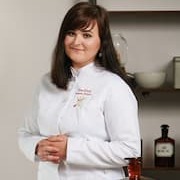

Learn more about our editorial process
.

Learn more about our editorial process
.

Learn more about our editorial process
.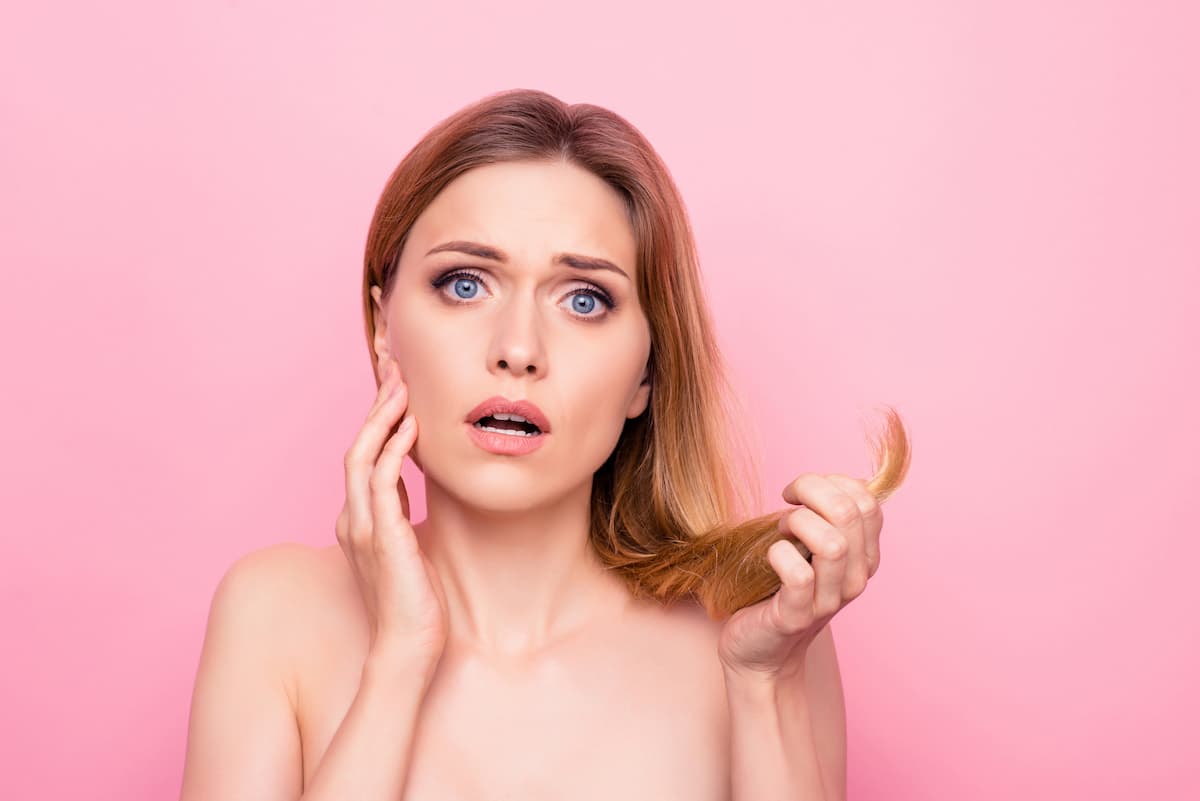
Why you can trust us
Articles on Natu.Care are written based on scientific research, data from government websites and other reliable sources. The texts are written in cooperation with doctors, nutritionists and other health and beauty experts. Articles are reviewed before publication and during significant updates.
.Learn more about our editorial process
.Information about advertisements
Content on Natu.Care may contain links to products from the sale of which we may receive a commission. When creating content, we adhere to high editorial standards and take care to be objective about the products discussed. The presence of affiliate links is not dictated by our partners, and we select the products we review ourselves completely independently.
.Learn more about our terms and Conditions
.Choose the best vitamin complex for your hair. The following overview will help you find the hair vitamins tailored to your needs and explain what criteria to use when looking for the perfect product.
Your hair grows at a rate of 0.014 mm per hour. Doesn't sound like much, but when you come back here in a month's time to recommend the article to a friend - you will have gained up to 1.5 cm of hair! What makes hair grow fast and strong? An adequate supply of nutrients.
From this article you will learn:
- What vitamin supplements are best for hair .
- What to look out for when buying hair vitamins .
- Which vitamins and minerals are most important for hair health .
- Why hair is weak, falling out and what to do about it .
The article is divided into two parts:
- In the first you will find a ranking prepared in consultation with Ilona Krzak, a pharmacist, where you will find recommended products that improve the condition of your hair.
- The first part of the article is the following.
- In the second you will find out which vitamins help your hair, when to go to the doctor and what tests to perform to rebuild, strengthen and nourish weakened hair.
- The second part is the ranking prepared in consultation with Illy Krzak, a pharmacist.
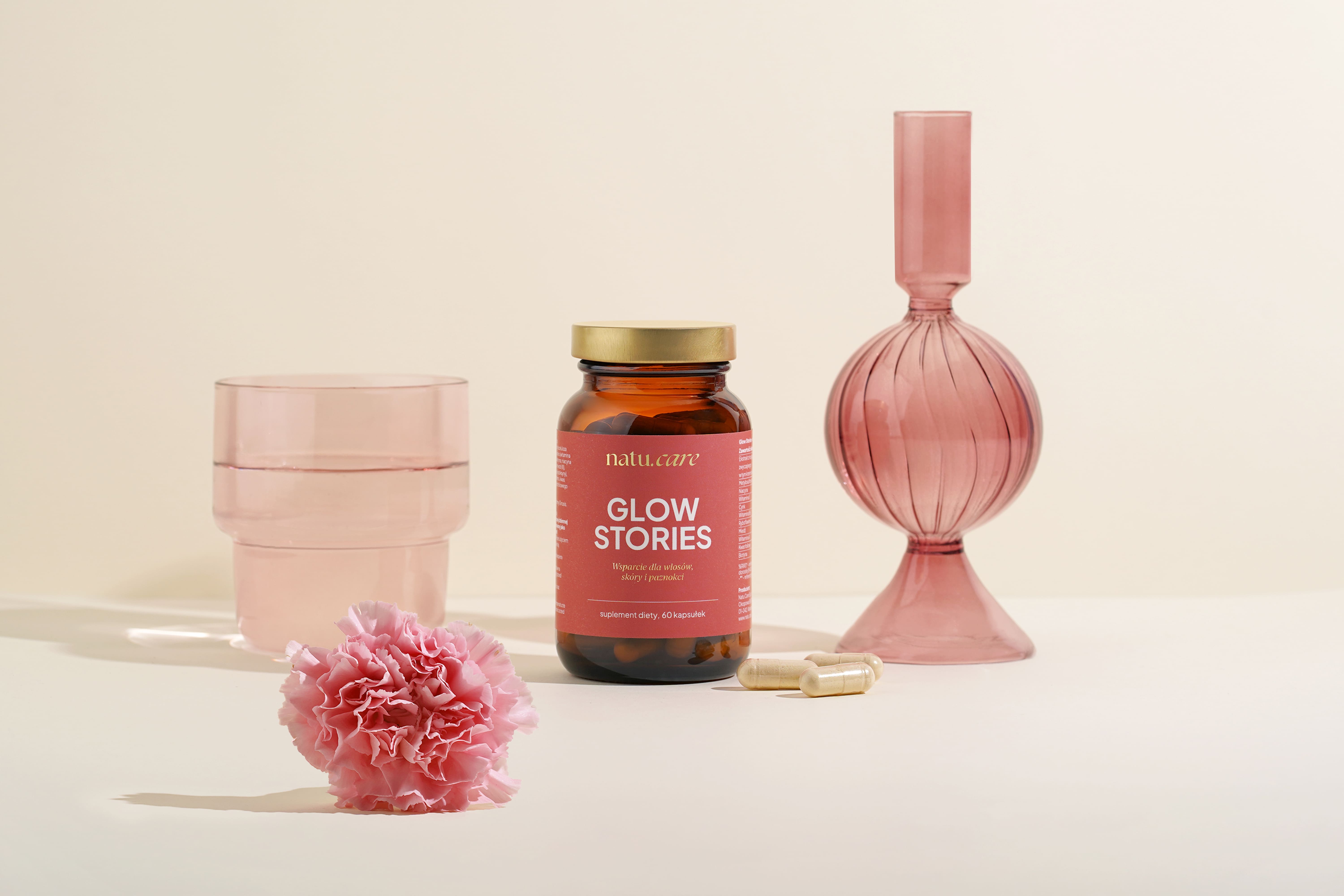
Odkryj, co dla Twojej urody może zrobić Natu.Care Glow Stories
Skóra, włosy, paznokcie: Glow Stories
Wesprzyj prawidłowy stan skóry, włosów i paznokci i ochroń komórki przed stresem oksydacyjnym!
Sprawdź cenę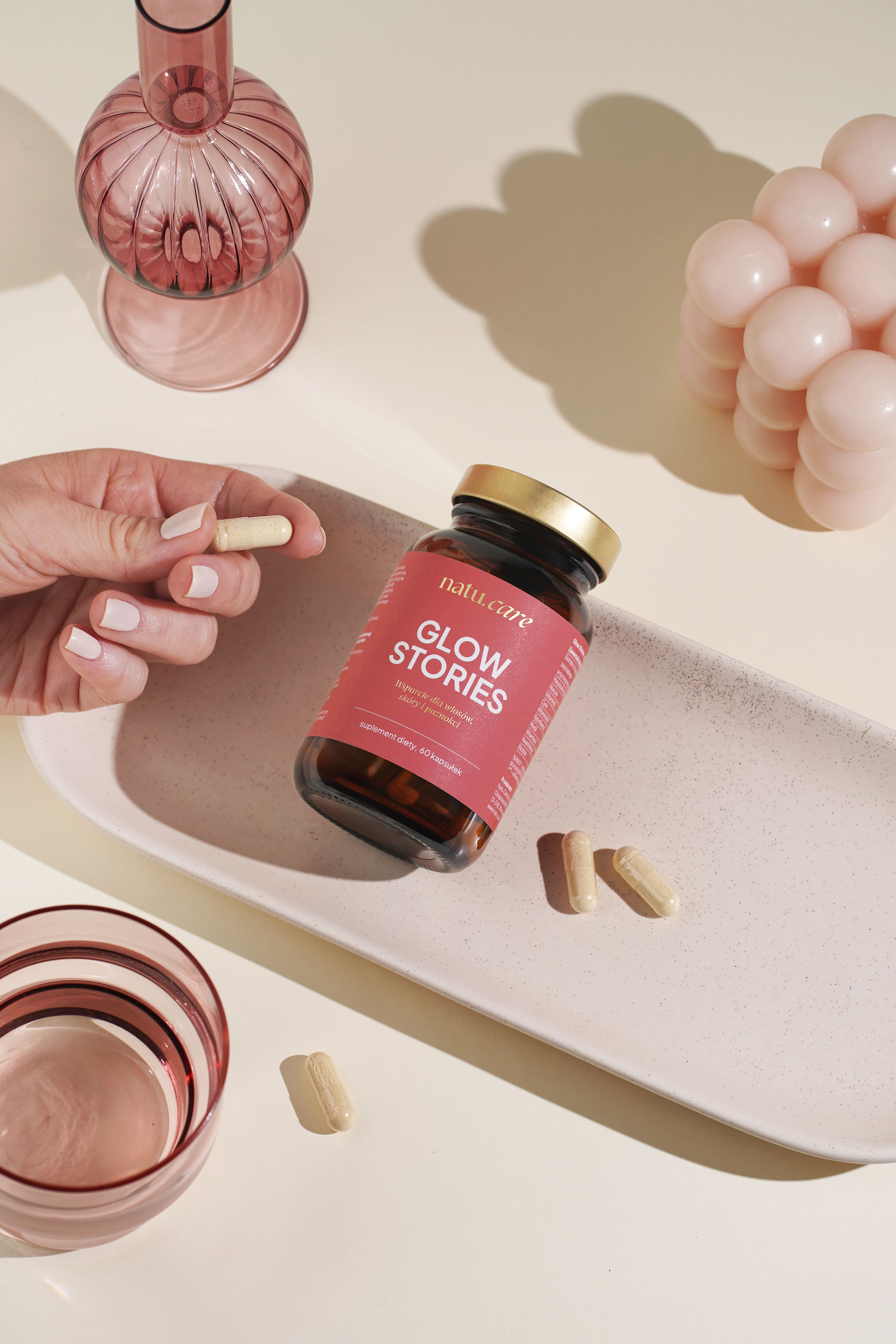
Glow Stories to formuła aktywnych składników, które zostały starannie dobrane wedle najnowszych badań naukowych. Znajdziesz w nich biotynę, cynk i miedź pielęgnujące zdrowie włosów i promiennej cery. Ponadto cynk jest odpowiedzialny także za zachowanie zdrowych paznokci. Mądra suplementacja zadba o Twoje piękno od środka.Julia Skrajda, dietetyk kliniczny
See also:
- Glow Stories for hair, skin and nails .
- Hair supplements
- Collagen for hair, skin and nails
- Collagen for hair
- Hair loss supplements
- Hair loss shampoos
- Hair loss conditioners
- Hair loss
- Solgar Hair Skin Nails - compositional analysis .
Best vitamins for hair
.
The best vitamins for hair are the B vitamins, especially B7 (biotin) and B9 (folic acid), vitamins A, E, C and D. Look for these vitamins in dietary supplements as they affect the health and appearance of hair. Look out for omega-3 fatty acids, minerals (e.g. zinc) and plant extracts.
Don't know where to look? I've teamed up with an MSc pharmacist to analyse the compositions of hair supplements to make it easier for you to choose.
The following is a list of hair supplements.
Ranking - the best hair vitamins in 2023
.
Criteria for selection
.
The ranking of the best hair vitamins was made with pharmacist Ilona Krzak according to the following criteria:
.
- .
- quality of active ingredients, .
- form of absorption, .
- impact on hair, .
- performance, .
Below you will find a detailed product analysis to help you choose the best hair vitamins for you or a loved one.
Collagen Booster - Glow Stories
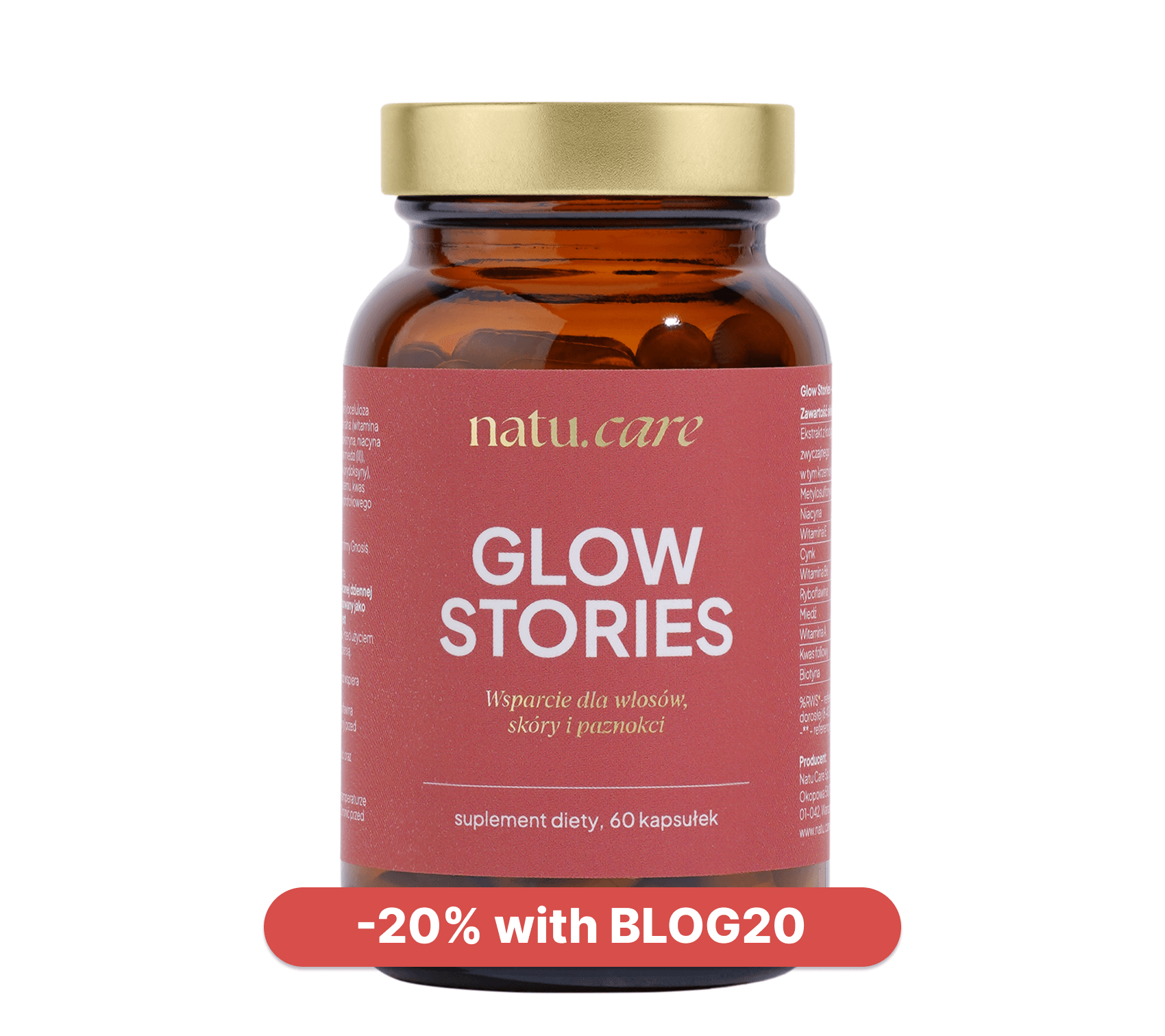
- Active ingredients: bamboo shoot extract, Quatrefolic®, L-Methionine, L-cysteine, vitamin E, vitamin A, niacin (vitamin B3), vitamin B6, vitamin B2 (riboflavin), biotin, zinc, copper
- .
- Form: capsules
- .
- Dose: 1 capsule per day
- .
- Sufficient for: 60 days
- .
Product description
A dietary supplement containing vitamins, minerals and plant extracts thatósupport the skinóhand, hair and nails. The product is especially distinguished by the form of folate – it is Quatrefolic, whichós absorbed very well and is natural.
In addition to valuable vitamins and minerals, such as vitamin A, E, B3, B2 and biotin, the formula contains bamboo shoot extract, whichóry further enhances your beauty.
Pros and cons
A dietary supplement containing vitamins, minerals and plant extracts thatósupport the skinóhand, hair and nails. The product is especially distinguished by the form of folate – it is Quatrefolic, whichós absorbed very well and is natural.
In addition to valuable vitamins and minerals, such as vitamin A, E, B3, B2 and biotin, the formula contains bamboo shoot extract, whichóry further enhances your beauty.
Additional information
A dietary supplement containing vitamins, minerals and plant extracts thatósupport the skinóhand, hair and nails. The product is especially distinguished by the form of folate – it is Quatrefolic, whichós absorbed very well and is natural.
In addition to valuable vitamins and minerals, such as vitamin A, E, B3, B2 and biotin, the formula contains bamboo shoot extract, whichóry further enhances your beauty.
Biotebal Plus skin, hair, nails
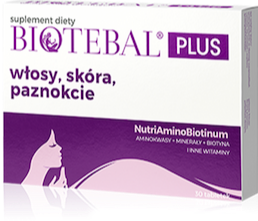
- Active ingredients: biotin, field horsetail herb extract, L-cysteine, L-methionine, zinc, iron, vitamin C, vitamin E, niacin (vitamin B3), copper, vitamin B6, vitamin B2 (riboflavin), folic acid, selenium .
- Form: capsules .
- Dose: 1 capsule per day .
- Sufficient for: 30 days .
Product description
A complex formula based on 14 active ingredients in the form of vitamins, mineralsós and an extract from field horsetail, whichós a source of silicon. Biotebal Plus contains a large portion of biotin, whichós effective in strengthening hair, giving it shine and preventing excessive hair loss.
.Thanks to its many active ingredients, the product helps firm the skinód of the face and strengthens the nail plate.
Pros and cons
A complex formula based on 14 active ingredients in the form of vitamins, mineralsós and an extract from field horsetail, whichós a source of silicon. Biotebal Plus contains a large portion of biotin, whichós effective in strengthening hair, giving it shine and preventing excessive hair loss.
.Thanks to its many active ingredients, the product helps firm the skinód of the face and strengthens the nail plate.
Additional information
A complex formula based on 14 active ingredients in the form of vitamins, mineralsós and an extract from field horsetail, whichós a source of silicon. Biotebal Plus contains a large portion of biotin, whichós effective in strengthening hair, giving it shine and preventing excessive hair loss.
.Thanks to its many active ingredients, the product helps firm the skinód of the face and strengthens the nail plate.
Expert opinion
A complex formula based on 14 active ingredients in the form of vitamins, mineralsós and an extract from field horsetail, whichós a source of silicon. Biotebal Plus contains a large portion of biotin, whichós effective in strengthening hair, giving it shine and preventing excessive hair loss.
.Thanks to its many active ingredients, the product helps firm the skinód of the face and strengthens the nail plate.
{ product:5RmWsoZ6aZcVjcY0rn6W1t }}
Summary
.
Good hair vitamins are complex dietary supplements containing vitamins in a sufficiently high and effective daily portion and in a well-absorbed form. Look for B vitamins, vitamins A, E, C, D omega-3 acids, minerals and plant extracts.
The most important vitamins and minerals for hair
.
Find out why our ranking took into account the active ingredients included that affect the scalp and hair.
Vitamin A
.
This vitamin is an important antioxidant that protects us from the effects of free radicalsand. This means that it prevents oxidation and cell destruction processes in the body. Vitamin A is involved in the sebaceous glands, which produce sebum that moisturises the scalp. A moisturised skin promotes proper hair growth.
Important!
Excess vitamin A can cause hair lossand - be sure to take sensible supplementation. Particular care should be taken by pregnant women as excess vitamin A is toxic to the foetus.
Vitamin E
.
Vitamin E is also an antioxidantand that protects our body's cells from ageing and damage. It promotes hair health by improving circulation and creating a protective barrier for the scalp, keeping hair moisturised and healthy. Softens the skin and reduces dryness .
Important!
.Some people choose to rub vitamin E oil directly onto the scalp, believing that this will speed up cell regeneration. However, there is no scientific evidence for this effect.
Vitamin D
.
Scientific research suggests that vitamin D deficiency can lead to baldness and hair loss . Low serum vitamin D levels can also inhibit hair growth. Vitamin D, specifically its receptors can help produce new hair follicles and restore hair growth. Vitamin D3 deficiency is common in Poland.
See also:
.Vitamin C
.
Vitamin C helps the body produce and maintain collagen, which contributes to healthy hair growthand. It helps the body better absorb zinc and iron - which also support healthy hair. In addition, it is a powerful antioxidant that protects the body's cells from ageing and damage.
See also:
.
B vitamins
.
Research suggests that deficiencies of the vitamins B2 (riboflavin), B7 (biotin), folate and vitamin B12 are linked to hair lossand. Their proper concentration in serum supports hair health by, among other things, protecting against antioxidants, strengthening hair structure, nourishing the scalp and supporting the formation of keratin - the building block of our hairand.
Zinc
.
This is an essential mineral that we need to supply to the body with our diet. It is crucial for skin, hair and nail growth, as it is involved in the proper formation of connective tissues and collagen synthesis .
Selenium
.
Our thyroid gland contains more selenium than any other organand. Selenium helps protect the thyroid gland from oxidative damage and plays a vital role in its hormone production. A properly functioning thyroid gland contributes to a healthy scalp and hairand.
Silicon
.
Silicon provides essential nutrients to the scalp and hair folliclesand. This mineral can prevent hair breakage . An additional benefit is its effect on strengthening the nail plate and improving the condition of skin throughout the body .
Iron
.
When there is a deficiency of iron, the body cannot produce blood haemoglobin. Haemoglobin transports oxygen for the growth and repair of cells in the body - including cells that stimulate hair growthand. Iron is involved in many physiological processes in the hair follicle. Studiesand suggest that iron deficiency may interfere with hair synthesis and manifest as alopecia and poor hair condition.
Ferritin
.
Ferritin is a protein that stores iron so that the body can use it when needed. A low concentration of ferritin results in a low concentration of iron. Without iron, the body cannot make enough red blood cells to transport oxygen in the body.
>
Fewer red blood cells means poorer oxygenation and nutrition of tissues, which can cause hair lossand.
Omega-3 fatty acids
.
Omeega acids, particularly omega-3, can affect the condition and appearance of our hairand. They provide essential nutrients to the hair follicles and skin. They prevent folliculitis (which is the cause of hair loss) and promote circulation in the scalp, which can stimulate hair growth .
You can read more about the interesting properties of omega acids in the articles:
.Amino acids
.
Amino acids are chemical compounds that, when they combine with each other, form proteinsand.
Protein and amino acid deficiencies can lead to weakening, thinning and hair lossand. Amino acids help the body function by stimulating tissue repair and regulating hormones . The most important amino acids for hair health are: methionine, cystine, cysteine, arginine and tyrosine.
Collagen
.
Collagen is rich in amino acids, so the right concentration can rebuild and strengthen the structure of hairand. Collagen also helps maintain the health of the dermis and prevents hair thinning . Interestingly, the compound protects pigment-producing cells, thus delaying the greying of hair .
Dietary vitamin supplementation for hair - advice from your doctor
.
When to take vitamins for hair
.
Before starting supplementation with hair-dedicated products, carry out blood tests for vitamin and mineral deficiencies and test thyroid hormone levels. Consult your doctor for the results.
Why is it worth getting tested?
.
- .
- Make sure you know exactly what deficiencies you have - you won't be supplementing blindly. .
- By knowing what your specific deficiency is, you can save money and buy one instead of three dietary supplements.
- Remember that excess vitamins (e.g. A, E) can exacerbate hair problems - it's better to be sure of exactly what your body needs. .
Deficiency testing for vitamins important for hair
.
For hair problems such as thinning, loss, brittleness, it is worth taking the following blood tests to determine the concentration:
.
- iron, .
- ferritin, .
- zinc, .
- vitamin B12, .
- vitamin D3, .
- transferrin (transports iron in the blood). .
Thyroid research
.
Thyroid hormones and sex hormones are most important in hair growth. They influence the regulation of metabolism and the supply of the right amount of nutrients to the hairand. Too much thyroid hormone (hyperthyroidism) as well as too little (hypothyroidism) can cause problemsand with hair.
Doing the following tests will give a broad diagnostic picture and allow your doctor to more accurately identify the problem:
.
- thyroid hormones TSH, FT-3, FT-4, .
- expanded morphology, .
Primary care physician can make referrals for: morphology (basic or expanded), thyroid hormone TSH (from October 2022 also FT3 and FT4, when such tests can help to diagnose the disease) and serum iron determination..
 .
.
Witold Tomaszewskidoctor of medical sciences
.Referral for the remaining tests can be obtained from a specialist (e.g. endocrinologist) or performed privately.
Learn more about blood tests:
.Symptoms of vitamin and mineral deficiency in hair
.
If you suspect you may have a vitamin or mineral deficiency or endocrine problems, sign up for a check-up. How can you tell if your hair needs support?"
Symptoms:
- dry scalp, .
- itching of the scalp, .
- increased hair loss, .
- dry, frizzy hair,
- dry, frizzy hair, .
- split hair ends, .
- breakage of hair, .
Important!
.Deficiencies also manifest themselves through the skin and nails - pay attention to what condition they are in.
Dietary supplements for pregnant women
.
Pregnant women often turn to dietary supplements to ensure an adequate supply of vitamins and minerals that are important for the foetus and the health of the mother-to-be.
What should pregnant women look out for when deciding on supplementation?
.
Pregnancy supplements are an important dietary supplement for the pregnant woman. The need to take folic acid (sometimes in a methylated - active form) or vitamin D is well known. Therefore, if you are planning intensive supplementation or are carrying one out and are pregnant - talk to your gynaecologist about whether it is definitely good for you and your baby..
Arthur Drobniak Doctor of Medicine, specialist in gynaecology and obstetrics, co-founder of Feminature Clinic
Not all vitamins are good for pregnancy. For example, an excess of vitamin A is highly teratogenic, i.e. harmful to the foetus, adds the doctor.
See also:
- Most powerful collagen [ranking + types] .
- Facial collagen [effects + ranking] .
- Drinking collagen [effects + side effects] .
- Collagen for skin [ranking] .
- Collagen for joints [action + forms] .
- Collagen for hair [properties + effects]
- Collagen for wrinkles [ranking] .
- Collagen deficiency [causes + symptoms] .
In addition to supplementation and supporting your locks from the inside, it's worthwhile to systematically perform hair care treatments. Have you tried needle mesotherapy, homemade egg masks or special hair rubs? Share what has helped you - leave a comment.
.
Summary
.
From this article remember:
- Make sure you get a good supply of B vitamins, zinc, iron, omega acids, amino acids and vitamins A, E and C. .
- Good hair supplements should contain compounds that contribute to the condition of the scalp and hair, are in a well-absorbed form and do not contain unnecessary additives (e.g. sweeteners, colourings). .
- If your hair is in poor condition, get tested for vitamin and mineral deficiencies and have your hormone levels checked.
- Pay attention to your diet. Your menu should provide most of the vitamins and other nutrients important for your health. .
FAQ
.What vitamins for hair growth?
.The most important vitamins to support hair growth are:
.- Vitamin A - helps with sebum production, which moisturises the scalp and hair.
- B vitamins - including biotin, niacin (vitamin B3), pantothenic acid (vitamin B5) and vitamin B12 - help strengthen hair and prevent hair loss.
- Vitamin C - stimulates the production of one of the building blocks of hair, namely collagen.
- Vitamin D - strengthens hair and scalp, and may help prevent baldness.
- Vitamin E - acts as an antioxidant and improves blood circulation in the scalp.
What vitamins and minerals are missing when hair falls out?
.Excessive hair loss can be due to a deficiency of components such as:
- B vitamins, .
- biotin, .
- vitamin C, .
- vitamin D, .
- iron, .
- zinc, .
- omega-3 fatty acids, .
Hair loss can have various causes, and deficiencies are not necessarily the only reason. See a specialist - GP, dermatologist, trichologist, clinical nutritionist - to determine all causes and choose the best treatment. Additional examinations may be needed in establishing a diagnosis.
What to drink for hair loss.
Firstly, keep your body hydrated, which is important for skin and hair health - drink around 2-2.5 litres of water a day. Other drinks you can include in your menu include:
- green tea - a wealth of antioxidants;
- green tea.
- fruit and vegetable smoothies - especially with spinach, avocado, bananas, kale, strawberries and blueberries; .
- lemon juice - vitamin C supports the production of collagen;
- carrot juice - vitamin A is essential for the condition of the scalp and hair;
- coconut milk - contains biotin; .
As part of your supplementation, you can also use premium drinking collagen.
What to eat to make your hair thick.
If you want to enjoy healthy and thick hair, go for foods rich in:
in your daily diet.
- Protein (e.g. fish, eggs, seeds, meat);
- Protein (e.g. fish, eggs, seeds, meat).
- iron (e.g. kale, spinach, beans); .
- vitamin C (e.g. citrus, berries, peppers, sea buckthorn);
- vitamin E (e.g. spinach, vegetable oils);
- omega acids (e.g. oily fish, seeds, nuts, vegetable oils);
- vitamin A (e.g. carrots, spinach, pumpkin);
What to take to strengthen your hair?
.In addition to a balanced diet - after consulting your doctor or nutritionist - you can opt for responsible supplementation.
For hair strengthening, look for preparations with biotin, iron, zinc, copper, selenium or organic sulfur (MSM).
Supplement only those elements you are actually deficient in - excess is also detrimental to health.
.For suggestions of specific brands and products that you can also buy at the pharmacy, see the articles:
What is the best remedy for hair loss?
.There is no single best remedy for hair loss. The effectiveness of the treatment depends on the cause and appropriate diagnosis.
Commonly used remedies for hair loss are:
.- hair loss medications - corticosteroids prescribed for autoimmune diseases, e.g. alopecia areata; .
- Hormonal medications - mainly preparations containing minoxidil and finasteride; .
- hair loss shampoos and anti-dandruff shampoos - some products are dermocosmetic or medicinal due to their formulation;
Each of these can cause side effects, so always consult your doctor about their use.
What hormones are responsible for hair loss?
.The most important hormones associated with hair loss are:
.- dihydrotestosterone (DHT) - can affect hair growth by causing the hair follicles to shrink, leading to weakness and hair loss;
- .
- female hormones - low levels of oestrogen and progesterone can weaken hair; .
- hormones of the thyroid gland - regulate metabolism and affect hair growth. Both hypothyroidism and hyperthyroidism can lead to hair problems. Do regular thyroid tests. .
- Stress hormones - cortisol affects hair growth cycle and condition. Do regular cortisol testing. .
Resources
.See all
.Ablon, G. (2015). A 3-Month, Randomized, Double-Blind, Placebo-Controlled Study Evaluating the Ability of an Extra-Strength Marine Protein Supplement to Promote Hair Growth and Decrease Shedding in Women with Self-Perceived Thinning Hair. Dermatology Research and Practice, 2015, e841570. https://doi.org/10.1155/2015/841570
Aksu Cerman, A., Sarikaya Solak, S., & Kivanc Altunay, I. (2014). Vitamin D deficiency in alopecia areata. British Journal of Dermatology, 170(6), 1299-1304. https://doi.org/10.1111/bjd.12980
Almohanna, H. M., Ahmed, A. A., Tsatalis, J. P., & Tosti, A. (2019). The Role of Vitamins and Minerals in Hair Loss: A Review. Dermatology and Therapy, 9(1), 51-70. https://doi.org/10.1007/s13555-018-0278-6
Araújo, L. A. de, Addor, F., & Campos, P. M. B. G. M. (2016). Use of silicon for skin and hair care: An approach of chemical forms available and efficacy. Anais Brasileiros de Dermatologia, 91, 0331-0335. https://doi.org/10.1590/abd1806-4841.20163986
Basit, A., asghar, F., Sadaf, S., & Akhtar, M. W. (2018). Health improvement of human hair and their reshaping using recombinant keratin K31. Biotechnology Reports, 20, e00288. https://doi.org/10.1016/j.btre.2018.e00288
Billett, H. H. (1990). Hemoglobin and Hematocrit. In H. K. Walker, W. D. Hall, & J. W. Hurst (Eds.), Clinical Methods: The History, Physical, and Laboratory Examinations (3rd ed.). Butterworths. http://www.ncbi.nlm.nih.gov/books/NBK259/
Chasapis, C. T., Ntoupa, P.-S. A., Spiliopoulou, C. A., & Stefanidou, M. E. (2020). Recent aspects of the effects of zinc on human health. Archives of Toxicology, 94(5), 1443-1460. https://doi.org/10.1007/s00204-020-02702-9
Guo, E. L., & Katta, R. (2017). Diet and hair loss: Effects of nutrient deficiency and supplement use. Dermatology Practical & Conceptual, 1-10. https://doi.org/10.5826/dpc.0701a01
How does the thyroid gland work? (2018). In InformedHealth.org [Internet]. Institute for Quality and Efficiency in Health Care (IQWiG). https://www.ncbi.nlm.nih.gov/books/NBK279388/
Hurrell, R., & Egli, I. (2010). Iron bioavailability and dietary reference values. The American Journal of Clinical Nutrition, 91(5), 1461S-1467S. https://doi.org/10.3945/ajcn.2010.28674F
Keen, M. A., & Hassan, I. (2016). Vitamin E in dermatology. Indian Dermatology Online Journal, 7(4), 311. https://doi.org/10.4103/2229-5178.185494
Le Floc'h, C., Cheniti, A., Connétable, S., Piccardi, N., Vincenzi, C., & Tosti, A. (2015). Effect of a nutritional supplement on hair loss in women. Journal of Cosmetic Dermatology, 14(1), 76-82. https://doi.org/10.1111/jocd.12127
Lis, D. M., & Baar, K. (2019). Effects of Different Vitamin C-Enriched Collagen Derivatives on Collagen Synthesis. International Journal of Sport Nutrition and Exercise Metabolism, 29(5), 526-531. https://doi.org/10.1123/ijsnem.2018-0385
Lopez, M. J., & Mohiuddin, S. S. (2022). Biochemistry, Essential Amino Acids. In StatPearls. StatPearls Publishing. http://www.ncbi.nlm.nih.gov/books/NBK557845/
Marcos-Garcés, V., Molina Aguilar, P., Bea Serrano, C., García Bustos, V., Benavent Seguí, J., Ferrández Izquierdo, A., & Ruiz-Saurí, A. (2014). Age-related dermal collagen changes during development, maturation and ageing - a morphometric and comparative study. Journal of Anatomy, 225(1), 98-108. https://doi.org/10.1111/joa.12186
Palace, V. P., Khaper, N., Qin, Q., & Singal, P. K. (1999). Antioxidant potentials of vitamin A and carotenoids and their relevance to heart disease. Free Radical Biology and Medicine, 26(5), 746-761. https://doi.org/10.1016/S0891-5849(98)00266-4
Rahmani, W., Abbasi, S., Hagner, A., Raharjo, E., Kumar, R., Hotta, A., Magness, S., Metzger, D., & Biernaskie, J. (2014). Hair Follicle Dermal Stem Cells Regenerate the Dermal Sheath, Repopulate the Dermal Papilla, and Modulate Hair Type. Developmental Cell, 31(5), 543-558. https://doi.org/10.1016/j.devcel.2014.10.022
Rasheed, H., Mahgoub, D., Hegazy, R., El-Komy, M., Hay, R. A., Hamid, M. A., & Hamdy, E. (2013). Serum Ferritin and Vitamin D in Female Hair Loss: Do They Play a Role? Skin Pharmacology and Physiology, 26(2), 101-107. https://doi.org/10.1159/000346698
Rushton, D. H. (2002). Nutritional factors and hair loss. Clinical and Experimental Dermatology, 27(5), 396-404. https://doi.org/10.1046/j.1365-2230.2002.01076.x
Trost, L. B., Bergfeld, W. F., & Calogeras, E. (2006). The diagnosis and treatment of iron deficiency and its potential relationship to hair loss. Journal of the American Academy of Dermatology, 54(5), 824-844. https://doi.org/10.1016/j.jaad.2005.11.1104
Trumbo, P., Yates, A. A., Schlicker, S., & Poos, M. (2001). Dietary Reference Intakes: Vitamin A, Vitamin K, Arsenic, Boron, Chromium, Copper, Iodine, Iron, Manganese, Molybdenum, Nickel, Silicon, Vanadium, and Zinc. Journal of the American Dietetic Association, 101(3), 294-301. https://doi.org/10.1016/S0002-8223(01)00078-5
Van Neste, D., & Tobin, D. J. (2004). Hair cycle and hair pigmentation: Dynamic interactions and changes associated with aging. Micron (Oxford, England: 1993), 35(3), 193-200. https://doi.org/10.1016/j.micron.2003.11.006
Ventura, M., Melo, M., & Carrilho, F. (2017). Selenium and Thyroid Disease: From Pathophysiology to Treatment. International Journal of Endocrinology, 2017, 1297658. https://doi.org/10.1155/2017/1297658
Vincent, M., & Yogiraj, K. (2013). A descriptive study of alopecia patterns and their relation to thyroid dysfunction. International Journal of Trichology, 5(1), 57. https://doi.org/10.4103/0974-7753.114701
Wickett, R. R., Kossmann, E., Barel, A., Demeester, N., Clarys, P., Vanden Berghe, D., & Calomme, M. (2007). Effect of oral intake of choline-stabilized orthosilicic acid on hair tensile strength and morphology in women with fine hair. Archives of Dermatological Research, 299(10), 499-505. https://doi.org/10.1007/s00403-007-0796-z
.Yang, F.-C., Zhang, Y., & Rheinstädter, M. C. (2014). The structure of people's hair. PeerJ, 2, e619. https://doi.org/10.7717/peerj.619
Yano, K., Brown, L. F., & Detmar, M. (2001). Control of hair growth and follicle size by VEGF-mediated angiogenesis. The Journal of Clinical Investigation, 107(4), 409-417. https://doi.org/10.1172/JCI11317
..
Editorials
Meet the team

Ilona Krzak obtained her Master of Pharmacy degree from the Medical University of Wrocław. She did her internship in a hospital pharmacy and in the pharmaceutical industry. She is currently working in the profession and also runs an educational profile on Instagram: @pani_z_apteki

Editor
Graduate of Journalism and Artes Liberales at the University of Warsaw. Since 2017, he has been working with the biggest portals in Poland and abroad as an editor. Previously worked for 3 years in one of the leading pharmaceutical companies - he knows the health and beauty industry inside out. In his free time, he most enjoys playing tennis or skiing.

Find out what to do when hair starts to fall out by the handful.

See how to effectively moisturise dry hair.
![Hair oiling: overnight, wet, dry [home remedies].](https://cdn-resources.natu.care/uploads/1/side_view_man_hair_slugging_night_routine_1_95e3d6a24c.jpg)
Everything you need to know to do hair oiling at home.
